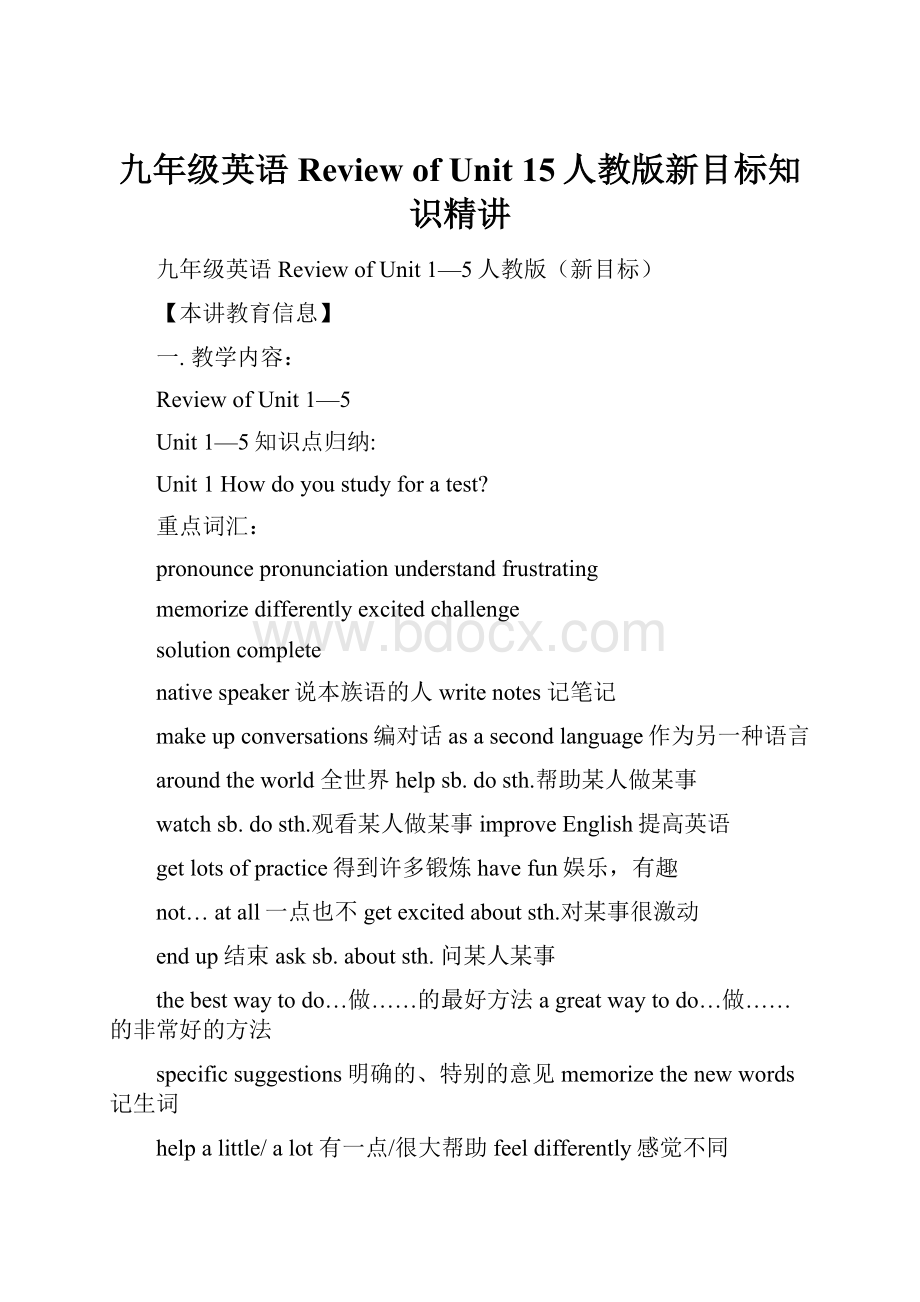九年级英语Review of Unit 15人教版新目标知识精讲.docx
《九年级英语Review of Unit 15人教版新目标知识精讲.docx》由会员分享,可在线阅读,更多相关《九年级英语Review of Unit 15人教版新目标知识精讲.docx(22页珍藏版)》请在冰豆网上搜索。

九年级英语ReviewofUnit15人教版新目标知识精讲
九年级英语ReviewofUnit1—5人教版(新目标)
【本讲教育信息】
一.教学内容:
ReviewofUnit1—5
Unit1—5知识点归纳:
Unit1Howdoyoustudyforatest?
重点词汇:
pronouncepronunciationunderstandfrustrating
memorizedifferentlyexcitedchallenge
solutioncomplete
nativespeaker说本族语的人writenotes记笔记
makeupconversations编对话asasecondlanguage作为另一种语言
aroundtheworld全世界helpsb.dosth.帮助某人做某事
watchsb.dosth.观看某人做某事improveEnglish提高英语
getlotsofpractice得到许多锻炼havefun娱乐,有趣
not…atall一点也不getexcitedaboutsth.对某事很激动
endup结束asksb.aboutsth.问某人某事
thebestwaytodo…做……的最好方法agreatwaytodo…做……的非常好的方法
specificsuggestions明确的、特别的意见memorizethenewwords记生词
helpalittle/alot有一点/很大帮助feeldifferently感觉不同
makemistakes犯错误beafraidtodosth.怕做某事
WaysoflearningEnglish:
听磁带做认读卡做词汇表朗读课文和朋友一起学习请老师帮忙
做笔记和一个小组共同学习看录像带参加学习小组和朋友一起练习对话
朗读练习发音唱英语歌学习语法读英语报纸请家教
Grammarfocus
1.Howdoyoustudyforatest?
Istudybylisteningtotapes.
2.HowdoyoulearnEnglish?
Ilearnbystudyingwithagroup.
3.DoyoulearnEnglishbyreadingaloud?
Yes,Ido.
e.g.HowdoyoustudyEnglish?
Istudybylisteningtocassettes/studyingwithagroup/watchingTV/listeningtoEnglishlanguagemusic/takingpartinEnglishclassesafterschool/gettinganEnglishtutor/readingEnglishmagazines/surfingtheInternet…
DoyoulearnEnglishby…?
Yes,Ido./No,Idon’t.
SentenceStrures:
1.Howdoyoustudyfortests?
Well,Istudybyworkingwithmyclassmates.
2.Haveyoueverstudiedwithagroup?
Yes,Ihave.I’velearnedalotthatway.
3.I’mhavingtroublelearningEnglish.
Ican’tgetthepronunciationright.
4.Whataboutreadingaloudtopracticepronunciation?
Idothatsometimes.Ithinkithelps.
Whydon’tyoujoinanEnglishlanguageclubtopracticespeakingEnglish?
MaybeyoushouldjoinanEnglishclub.
5.ThebestwaytolearnnewwordsisbyreadingEnglishmagazines.
Studyinggrammarisagreatwaytolearnalanguage.
Memorizingthewordsofpopsongshelpsalittle.
Difficulties
1.Ican’treadfluently.
2.Ican’tspellsomeEnglishwords.
3.Ican’tunderstandspokenEnglish.
4.Ican’tpronouncesomeofthewords.
5.ImakemistakesinGrammar.
6.Ican’tunderstandthewordsinnewspapersandmagazines.
7.Idon’tgetmuchwritingpractice.
Solutions
1.Maybeyoushouldfindapenpal.
2.Youcanalwayswritethenewwordsinyournotebookandlearnthemathome.
3.Whydon’tyoujoinanEnglishlanguageclub?
4.YoucanwriteEnglishdiaryeveryday.
5.Listeningcanhelp.
6.TheylearntbyusingEnglish.
7.ThebestwaytolearnEnglishwordsisbyreadingEnglishmagazines.
8.Hethinksstudyinggrammarisagreatwaytolearnalanguage.
9.WatchingEnglishmoviesisn’tabadway.
10.JoiningtheEnglishclubisthebestwaytoimproveyourEnglish.
语法:
V+ing
总结:
动名词如何用?
一.介词后面的动词要变为动名词(-ing动词)
1.study/learnbywatching/listening…
2.What/Howaboutreading/speaking…
3.…isoneofthesecretsofbecomingagoodlanguagelearner.
4.Whenweaskaboutstudyinggrammar,shesaid…
5.Thankyouforinvitingme.
二.作主语的动词要变为动名词(-ing动词)
1.StudyinggrammarisagreatwaytolearnEnglish.(句子的主语)
2.IthinkwatchingEnglishmoviesisn’tabadway.(从句的主语)
3.Listeningcanhelp.(句子的主语)
Memorizingthewordsofpopsongshelpedalittle.
Hethinksstudyinggrammarisagreatwaytolearnalanguage.
语的单复数
e.g.StudyingEnglishisveryimportant.
Listeningmoreimproveslisteningskills.
Eatingtoomuchcanmakeusfat.
Eatingwellandsleepingwellhelpusstudywell.
三.有些动词后面要接动名词
WeendupspeakinginChinese.
Whydon’tyoujoinaclubtopracticespeakingEnglish?
NowIamenjoyinglearningEnglish.
Ifinishreadingthebook.
Wouldyoumindtakingoutthetrash?
Ioftenspendmoneybuyingbooks.
四.有些词组里用动名词
readingskills阅读技巧speakingskills口语技巧
listeningpractice听力练习writingpractice写作练习
注意:
spokenEnglish口头英语writtenEnglish书面英语
either和too的用法
Icouldn’talwaysmakecompletesentences,either.否定句
IoftenwatchEnglishmovies,too.肯定句
Unit2Iusedtobeafraidofdark.
重点词汇:
usedto,dark,spider,insect,along,quiet,snake,outgoing,friendly,serious,funny,outgoing,friendly,serious,funny,tall,shy,short,straight,longhair.
GrammarFocus:
1.Iwasn’tveryoutgoing.
Youusedtohavelonghair.
2.Didyouusetohavestraighthair?
Yes,Idid.
3.Didyouusetoplaythepiano?
No,Ididn’t.
语法:
一.usedtodosth
usedto中的to是不定式符号,后加动词原形,表示“过去常常做某事,而现在已不做”,时态形式不变。
1.肯定句
Heusedtogetupearly.
Theriverusedtobeclean.
2.否定句
在否定句中常用didn’tuseto,usednotto或usedn’tto
Hedidn’tusetogetupearly.
Theriverusedn’ttobeclean.
3.疑问句
在疑问句中常用Did…useto…?
或Used…to…?
Didyouusetobeateacher?
Usedyoutobeateacher?
4.反意疑问句
Sheusedtoliveinthecountry,didn’t/usedn’tshe?
Thereusedtobeabigtreehere,didn’t/usedn’tthere?
注意usedto与would用法区别:
(1)usedto表示过去习惯性的动作,现在已经不如此了;would则常用来表示过去和现在均可能有的习惯动作。
两者意思基本相同,但usedto较为口语化。
usedto常不需要表示时间的副词短语或从句,而would则需要。
例如:
Heusedtogetupearly.他过去起床很早。
Hewouldgetupearlywhenhewasyoung,andheisusedtogettingupearly.
他年轻的时候习惯于早起,现在仍习惯于早起。
(2)usedto既表动作,又表状态,而would只用于表动作。
如“她过去身体很好”只能译为Sheusedtobehealthy.,不能译成Shewouldbehealthy.
二.beusedto+n./doing
beusedto中的to是介词,后面加名词或doingsth,其中be有各种时态的变化形式,表示“习惯于……”。
例:
Sheisusedtolivinginthecountry.
Heisusedtohardwork/toworkinghard.
Iamnotusedtobeingspokentointhatrudeway.
You’llsoonbe/get/become/growusedtoourwayofliving.
Ihavebeenusedtorice/eatingrice.
三.usesth.todosth.(主动形式)“用……干某事”;sth.beusedtodosth.(被动形式)“……被用来干某事”。
例如:
(1)Iuseaknifetocutbread.
Aknifeisusedtocutbread.
(2)Theyusecoaltokeepwarm.
Coalisusedtokeepwarm.
Unit3Teenagersshouldbeallowedtochoosetheirownclothes.
GrammarFocus:
---Ithinkstudentsshouldbeallowedtodohomeworkwithfriends.
---Idisagree.Theytalkinsteadofdoinghomework.
---Sixteen-year-oldsshouldnotbeallowedtodrive.
---Iagree.Theyaren’tseriousenoughatthatage.
---Doyouthinksixteen-year-oldsshouldbeallowedtoworkatnight?
---No,Idon’t.
语法:
被动语态
英语中有主动和被动两种语态。
前者以动作的执行者充当主语,后者以动作的承受者(即宾语)充当主语。
由于只有及物动词才有宾语,因此只能是及物动词才有被动语态形式。
被动语态以助动词be加上动词的过去分词构成,如:
WespeakEnglish.(主动语态)
Englishisspoken.(被动语态)
有时为了表明动作的执行者,可在被动语态句型中加上介词by引导的短语,如:
Theglasswasbrokenbythecatyesterday.
由于动词be在不同时态中有不同形式,因此被动语态在各种时态中也有不同的结构。
一般现在时由am/are/is加上过去分词构成。
如:
Footballisplayedallovertheworld.
Theroomsarecleanedeveryday.
Unit4Whatwouldyoudo?
重点词汇:
inpublic当众,公开的plentyof很多的,足够的
getalongwith与……相处let…down使……失望或沮丧
comeupwith提出,想出winthelottery彩票中奖
medicalresearch医学研究getpimples长青春痘
too…to…太……而不能getnervous变得紧张
lookterrible看起来糟糕letmehaveone让我拥有一个
introduceoneself自我介绍speakinpublic在公共场合讲话
withoutpermission未经允许not…intheslightest一点也不
plentyof充足的getalongwithsb.与……相处
ratherthan而不是wouldrather…than…宁愿…而不
rightaway立刻,马上invitesb.todosth.邀请某人做某事
no…intheslightest一点也不cometop名列前茅
letsb.down让某人失望thinkof想出
comeupwith提出,想出
GrammarFocus:
1.---Whatwouldyoudoifyouwonamilliondollars?
---I’dgiveittocharities.
2.IfIwereyou,I’dwearashirtandtie.
3.IfIwereyou,I’dtakeasmallpresent.
语法:
虚拟语气
句子假设的情况如果是完全不存在的(与现在或过去的事实相反),或者实现的可能性很小(与将来的事实可能相反),这种句子叫做虚拟条件句,它的谓语动词用虚拟语气。
表示与现在事实相反的情况时,条件从句的动词用一般过去式(be的过去式用were或was),主句的动词用would(should,could或might)加动词原形。
只需掌握与现在事实相反的情况,其结构为:
从句
主句
If+主语+动词的过去时
主语+would+动词原形
e.g.IfIwereyou,Ishould/wouldgoatonce.
IwouldcertainlygoifIhadtime.
Unit5ItmustbelongtoCarla
重点词汇:
SectionA:
toycar玩具汽车favoriteauthor最喜欢的作家atthepicnic在野餐中
listento…听……classicalmusic传统音乐ahairband一个发带
belongto…属于……theyboth他们两个gototheconcert去音乐会
duringtheconcert在音乐会中inthesymphonyhall在交响乐大厅
trytodosth.设法做某事amathtestonalgebra数学的代数考试
thefinalexam期末考试count30%to…百分之三十计入……
becauseofsth./doingsth.因为……apresentfor…给某人的礼物
SectionB:
inthesky在天空中astrangecreature一个奇怪的生物wearasuit穿西服
awomanwithacamera带着照相机的妇女catchabus赶公共汽车
usedto…过去常常……thesedays近来inourneighborhood在我们社区
thelocalschool/newspaper/zoo地方的学校/报社/动物园strangenoises奇怪的声音outsideourwindow在窗户外havefun娱乐nextdoorneighbor隔壁邻居
atfirst开始beworried焦虑的theremustbe一定有inthehallway在走廊
getinthewindow进入窗户infrontof在……的前面escapefrom从……逃出
inanocean在海洋里toomuch太多
SelfCheck:
becarefulof…小心……beafraidofdoingsth.害怕做……getontheplane上飞机
beworriedabout…担心……astrangesmell一种奇怪的味道useup用完、耗尽
GrammarFocus:
1.---Whosenotebookisthis?
---ItmustbeNing’s.Ithashernameonit.
2---WhoseFrenchbookisthis?
---ItcouldbeAli’s.ShestudiesFrench.
3.---Whoseguitaristhis?
---ItmightbelongtoAlice.Sheplaystheguitar.
4.---WhoseT-shirtisthis?
---Itcan’tbeJohn’s.It’stoosmallforhim.
语法:
表推测的情态动词must,might,could,can’t的用法
可能性和推测:
must很可能,一定,肯定
might也许,或许,可能
could能,可能
can't不能,不会
语言点:
1.must
might/could+动词原形
can’t
e.g.Theymustbevolunteers.
Itmustmean“concerthall”.
HemustbewatchingTV.
HemightbeMary’sbrother.
Hecouldcomeheretonight.
Hemightbewaitingforabus.
Itcan’tbeourteacher’s.
Itcan’tmean“happy”.
Ourteachercan’tbelisteningtomusic.
2.belongto+名词或代词宾格
be+名词所有格或名词性物主代词
e.g.ItmustbelongtoMary.
Thecatmightbelongtoher.
Thebookcan’tbelongtome.
ItmustbeMary’s.
Thecatmightbehers.
Thebookcan’tbemine.
3.because+从句
becauseof+名词/动名词
e.g.Hedidn’tcomebecausehewasill.
Hedidn’tcomebecauseofillness.
Ican’tgotherebecauseitisdark.
I